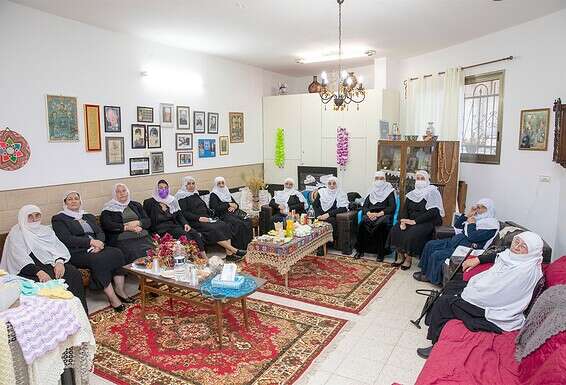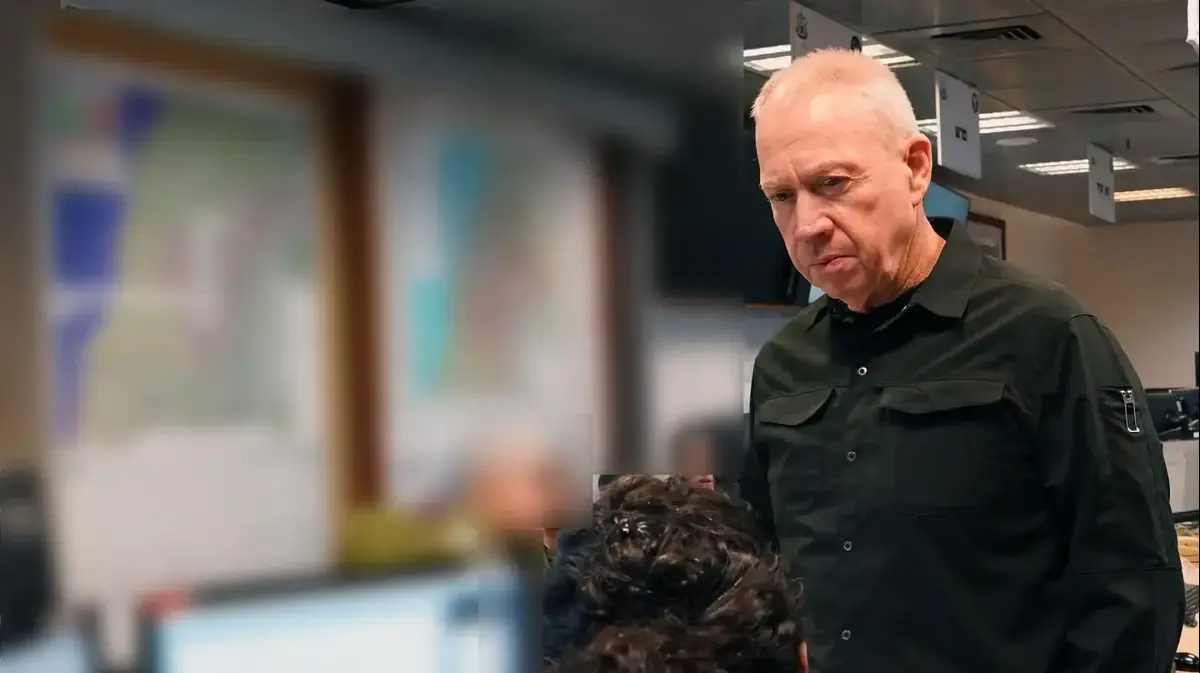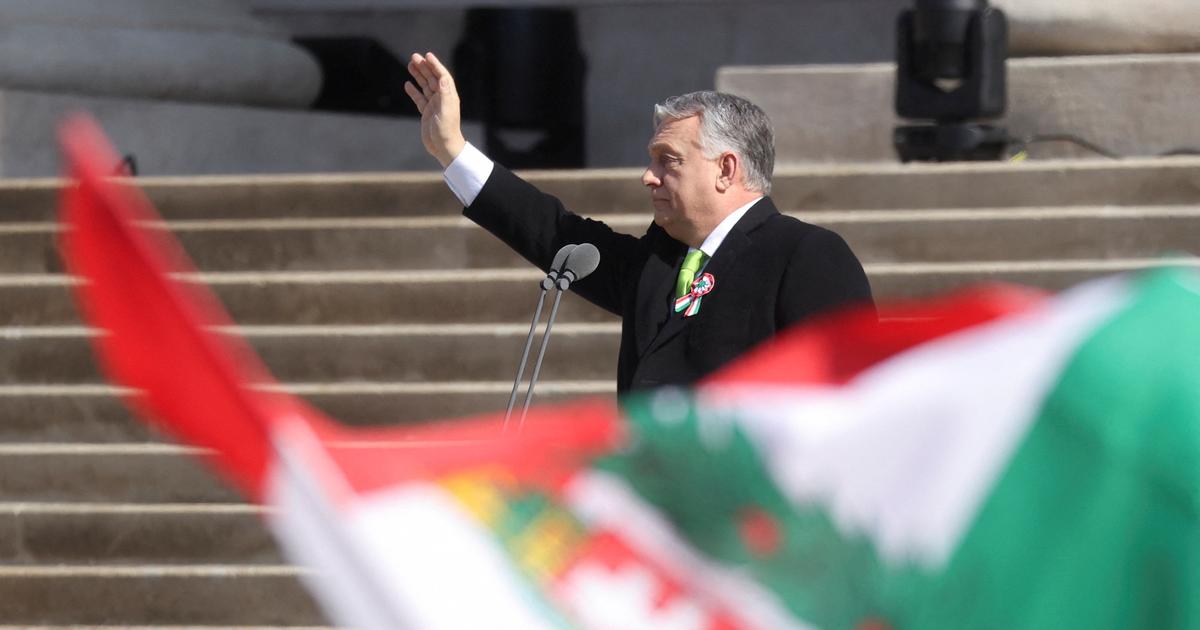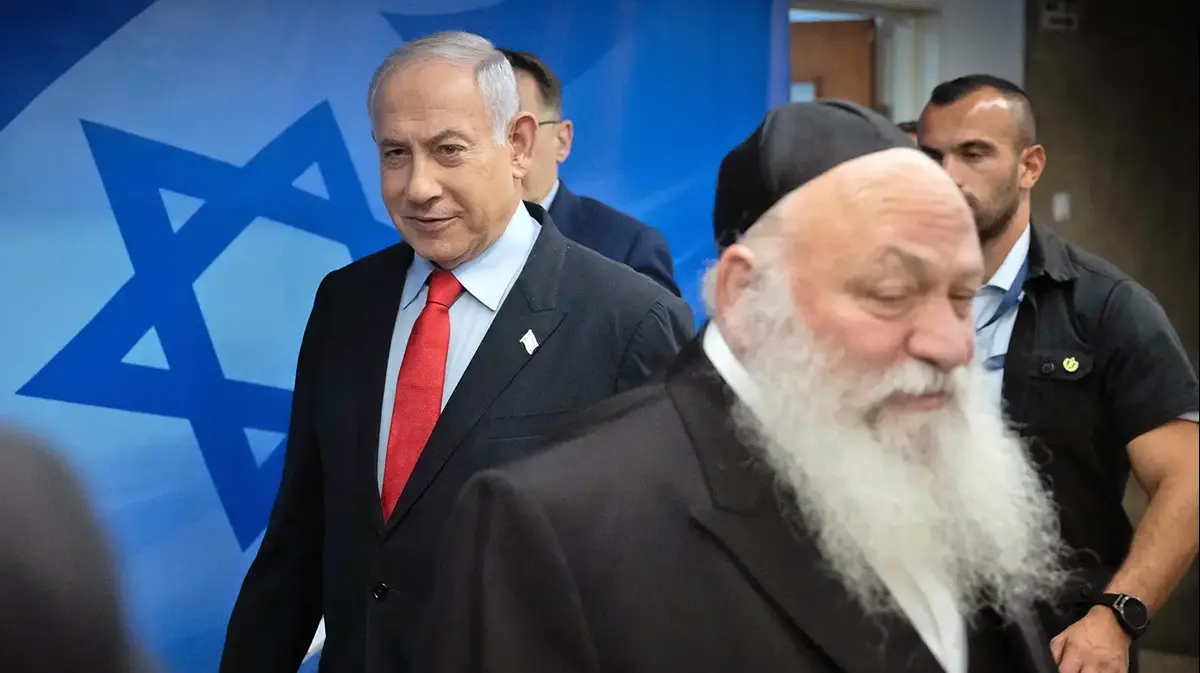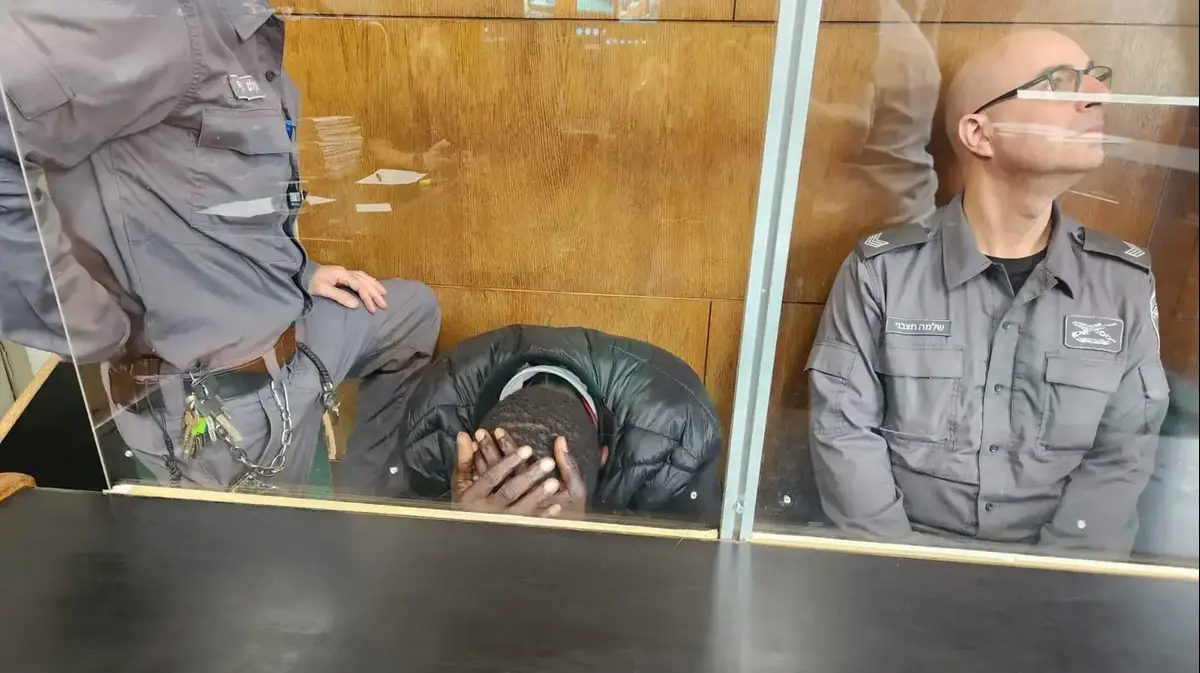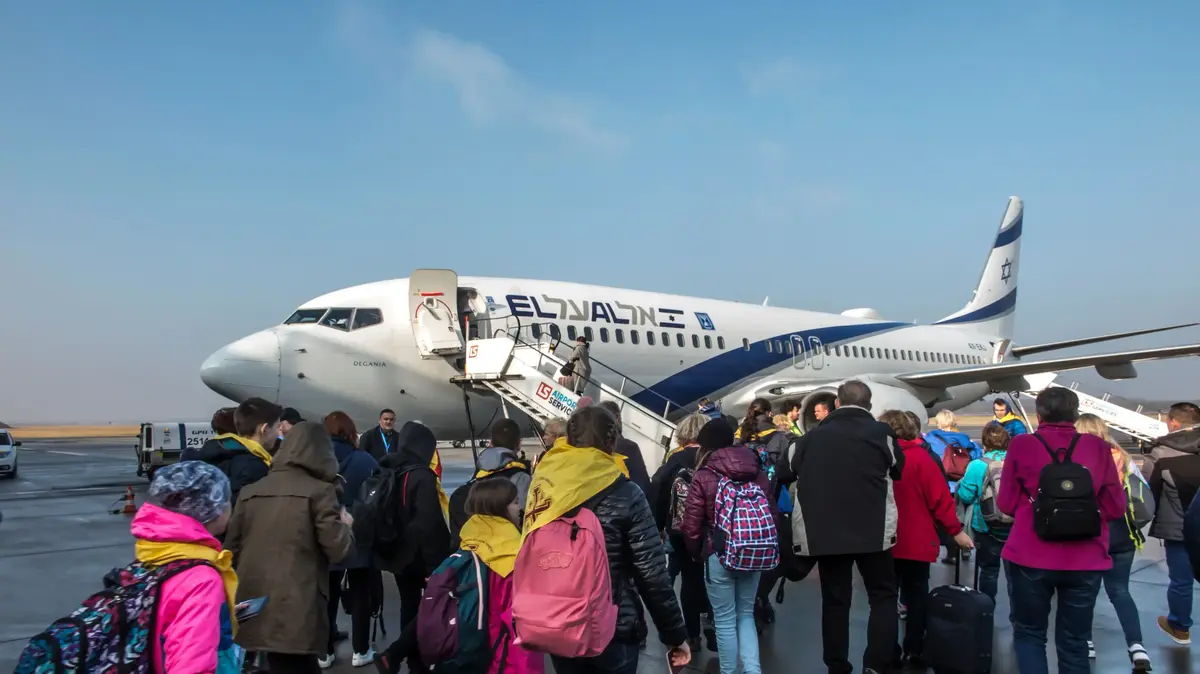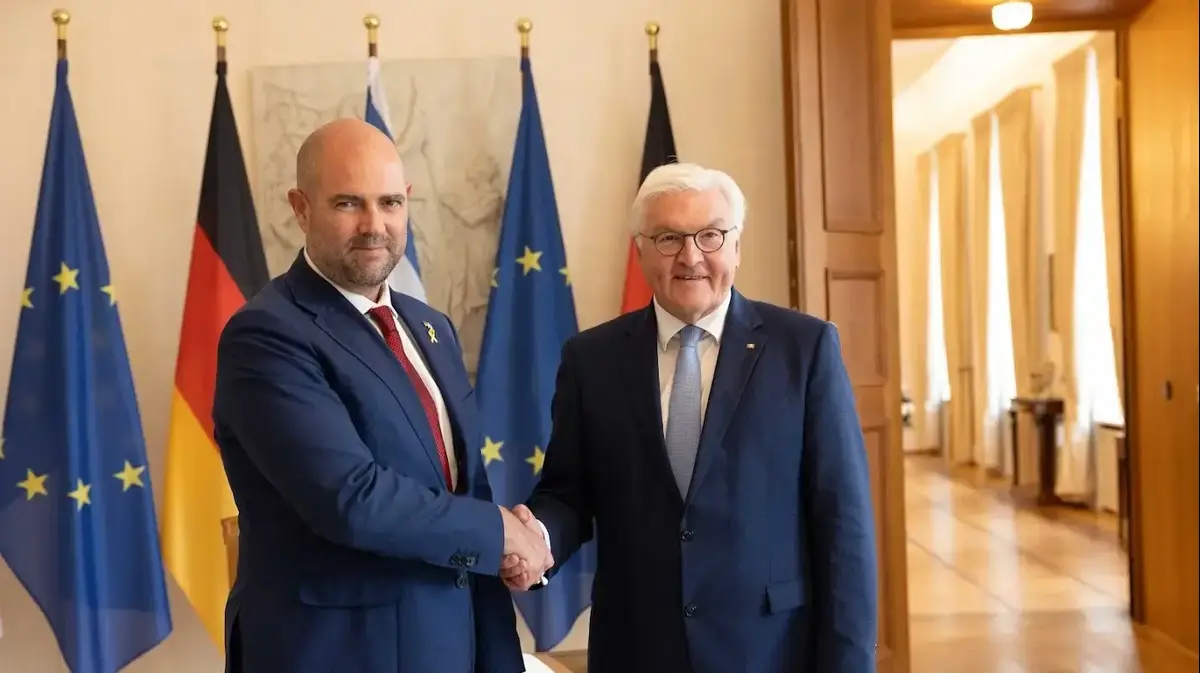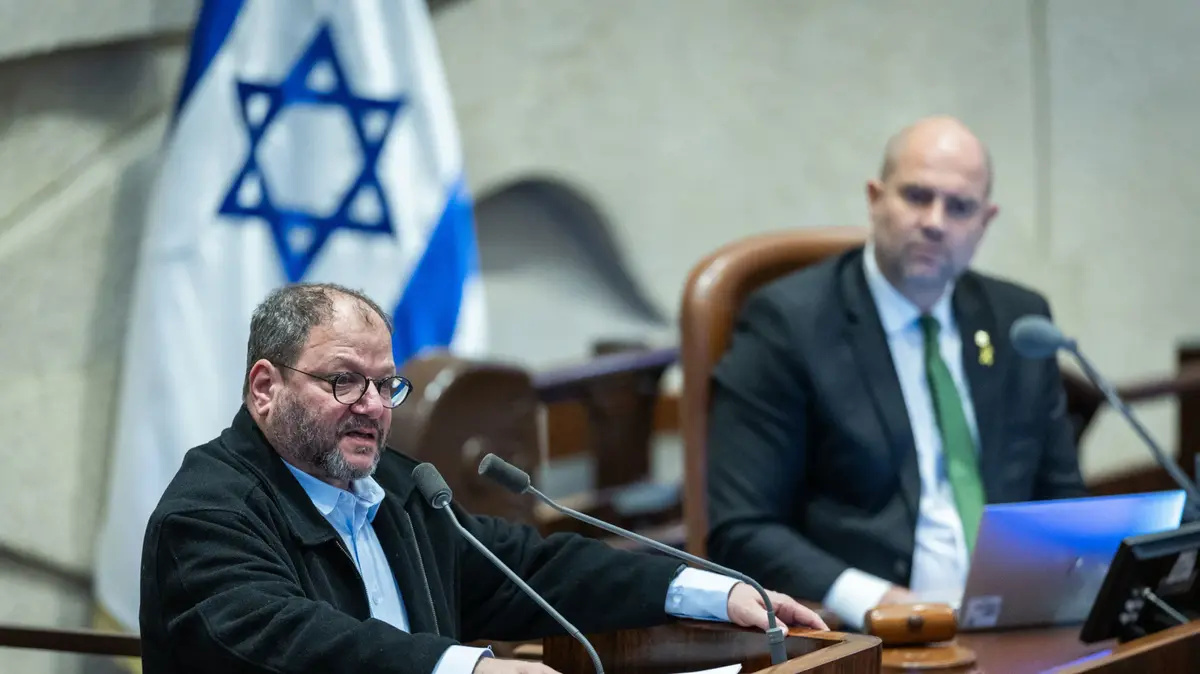For six years, a group of IDF widows and bereaved mothers from the Druze community met every week • After the corona plague forced them to take a long break, they met again
The technological difficulty did not make it possible to bridge the distance.
The women's group in Daliyat al-Carmel
Photo:
Michelle dot com
After a year of corona and disconnection, the excitement is evident in each of the 20 women who gather at the "hot house" in Daliyat al-Carmel.
The reunion does not leave in its indifference even the observer from the side, who does not know the characters and only looks at how they approach each other with a wave of joy, with teary eyes, clinging to hugs that are not soon released.
What these women have in common - apart from the traditional uniform that clarifies their piety and characterizes their Druze origins - is a deep internal rift and belonging to the Israeli bereaved family.
The proximity of the dates of the corona's decline with the Day of Remembrance for the Martyrs of the Israeli Civil War makes the meeting even more festive and exciting.
Until the outbreak, they used to meet every week for six years in what is known as the Warm House, a general name for therapy that began with two hours of group discussion and turned into an average of four to five hours of tree-meeting, initiated by the Department of Families, Commemoration and Heritage.
"Widows I used to meet for emotional therapy described themselves as walking dead," says Rauda Mansour Zarqa, the social worker who accompanies the group, "and I was looking for a solution to the difficult experience, so no matter how many years have passed since then, something has been found to get them out."
This is how the meetings at the "Hot House" were born, to which trips, activities and outdoor meetings are added from time to time.
Bereaved widows and mothers sit in a circle in this house, which is generally the living room of Manwi Ali, who lost her son Saleh in the natural disaster in Neot HaKikar in 1970.
"After such a disaster you can not go on with life, I was a mother who was all 35. I had 11 children. I wanted to go on living, and I did not know how. We decided to have another son, two daughters were born after him," she smiles.
It has been 12 years since the tragedy in which her husband was also killed, and she was left alone in the face of her life's mission - raising the entire tribe.
In Manoi's living room is a picture of the fallen son, and around it are framed pictures of Rabin, Netanyahu, Rivlin, several chiefs of staff from the history of Israel, leaders of the Druze community and other Israeli military symbols that can only be found on these walls. Manvii's daughters come to help her return. And stories that in the past year, every Wednesday at the time of the meeting, she would lie in bed crying about the absence of her friends.The attempts to bring the girls to a zoom meeting were unsuccessful, and only recently one of them started a WhatsApp group in which about half of her friends manage to be partners.
"You have to understand," Rauda explains to me as we sit in the large circle and I ask why there were no zoom meetings or actual meetings for women who were isolated anyway because of the corona, "this is no ordinary group, most women here belong to another generation. It is a very traditional, patriarchal society. "Not technologically. On the previous Memorial Day we had a zoom session, and then what we tried did not work."
She is complemented by Aliza Said, who was widowed in 1978 by her husband, Lt. Col. Hassan Said, commander of an infantry branch.
"I was called by the IDF Widows' Organization, they tried to explain to me how to zoom in, I could not.
The children and grandchildren wanted to come and help me, because they know how much I depend on these encounters, but once I was afraid of being infected by them, once they were afraid of being infected by me, and in the end I sat at home alone. "The companies nodded.
"Religious laws are fully respected and respected, and they are very restrictive. Even if there was a husband in the area, all under the scrutiny of the community. It's like a kibbutz. Even if you get a license, you will not act because the clergy forbid you, whoever practices - risks a religious boycott "When you are a widow. And when you are not mobile, your chances of advancing in life, getting out of the missing place and bereavement and breaking forward - are reduced."
There are families where they come to help and there are homes where the quiet is felt.
Would you like to remarry?
"No!", All the members of the circle answer me.
Most hold pictures of the husband, some show his picture on WhatsApp, sometimes in black and white.
Nabila: "With us, women give everything for the husband and the family. To the children, to the grandchildren, to the brides. We are like maids. Our needs are pushed aside. Once we have done it."
Aliza: "Even if the Ministry of Defense offers new grooms, say no. Just want fun days with the warm house!".
Everyone laughs, and after the meeting they free up to gather for the stories, to return to the starting point where each one's pain begins.
The first cohabitation is of Lauiza Nasser-al-Din, who lost her husband, Sergeant Lutfi-Amal Nasser-al-Din, on May 7, 1969. Laoiza takes a deep breath, closes her eyes, and returns to herself 52 years ago: " My daughter Rima was 56 days old.
Lutfi spoke to me on the phone, not everyone had a phone then, and he called the neighbors so we could talk.
After regular service as a lieutenant colonel came his release day, and we wanted to celebrate.
"He informed me that he was leaving home soon from the Arava. I did not know that shortly after we finished the call he heard the commander in contact instructing the soldiers to go in pursuit of eight Jordanian terrorists who had infiltrated from the border, and decided to join. I was later told that the commander could not "He's released and he has to go home. But Lutfi insisted. He went back and was killed."
The celebration at home was ready
Laoza quickly goes over the details of the battle, and when I ask what she remembers from those moments, from the moment she hung up after informing her that he was leaving the Arava for release - she is radiant, describing how she bathed Rima and dressed her in a white dress, how she dressed, wore special clothes she bought Lutfi She recovered shortly before, and used the "Courage" perfume he loved.
"All in his honor," she holds her wrists in the exact location where she wore the gold bracelets he purchased for her for their marriage.
Her face is lit up until the moment she moves from the wrist that she wore the bracelets to the wrist that she wore the watch that showed her that time is ticking and something illogical in the hours that have passed without my caress returning.
"I went into restlessness, I moved from place to place, for so many hours. We lived then with my husband's parents, I went out into the yard. One eye of mine on a maggot and one eye on the street. That's how I passed the time, when anxiety envelops me. Suddenly a car came, I look and see "My father-in-law comes out of it. He did not look in my direction, and it was strange to me, there were also some of my husband's brothers with him, they looked aside, and I saw that they were crying. My mother-in-law asked them: What happened? And they answered her: The hero fell."
Do you see all this from the window?
"Yes. And I still did not understand that they were talking about my husband. I was shocked. I did not understand what happened, I went into the house. After a few minutes they came after me. Then I asked them what happened, and they told me. I tore off the gold bracelets," she tells Oiza with tears in her eyes. That she gestured the ripping movements from her wrists, "I could not move. I asked them to go check what was going on with Rima."
Laoza cries.
52 years later, she is back as a 22-year-old widow. "I still can't digest."
The orphan became a widow
Malka Shahidam, the oldest widow in the room, and the one who was widowed at the youngest age, is also connected to the feeling of shock that continues to accompany the women in the meeting to this day.
She lost her husband, Fuad-Saba, in August 1967, when he went to the reserve in al-Arish.
"On the way there was an accident between Rafah and Gaza. I was 19 and two months old. I had a baby, Nora, who was seven months old."
Malka says that the moment of the gospel was erased because of the shock, and that she began to digest the gospel only in the days of mourning: "People from the army came, to tell us what exactly happened and how it happened. I remember people sitting in front of me in uniform, and instead of their faces I imagined Fuad. Body in uniform, everyone is sitting in front of me and when they reach the head - as if my husband's face is jumping in front of me. "
Malka then lived in the house of her mother-in-law and mother-in-law, and after two years that included many proposals to remarry, she decided to return to her parents' house.
After another three years she married.
"My first husband was my aunt's son. After his death, I married my cousin. In our cultural perception, children do not belong to their mother but to the husband's family. That's why everyone here is afraid to get married," she says and seems to surround her group members with love.
"When a widow decides to get married, the children are taken away from her, and the husband's family raises them, because halakhically it is forbidden to grow up with a relative who is not a first-degree relative."
Rauda clarifies that today it is no longer exactly like that.
Malka recounts how her late husband's family took her orphaned daughter from her, and yet they maintained a continuous relationship and a good relationship, since her ex-husband's mother, "she is still my aunt."
However, the one who felt as if her father had been taken from her for the second time is her daughter, Nora, who did not get to grow up in a normal family as the eldest daughter of the six brothers her mother gave birth to, even though she wanted it very much.
"I lived with my new husband for 44 years, and she always received good treatment from him above and beyond," says Malka.
Five years ago he passed away.
Shortly afterwards, Nora's husband, a lieutenant colonel in the IDF, died, and thus Nora, an IDF orphan, joined the widows' circle of bereavement.
I got a role from God
When Donia Assad begins talking about her son Wafa, who fell in 1993 at the age of 27, she first shows a picture of Wafa, her granddaughter, who was born 40 days after his death.
"She is in her ninth month now, think what it is. My son will soon have a grandson from his daughter named after him, and he did not know her, nor will he know the grandson who will soon be born."
Donia wipes away the tears.
Sergeant Wafa Assad was released from permanent service when he was called up for reserve service in Gaza.
During a routine patrol he commanded a jeep, when a force of terrorists came in front of them, shot them at close range and killed him and two other fighters from the community.
The IDF legacy is strong in the family, Brigadier General Amal Assad is also your son.
"I was born on the night of a storm, my father said that when I was born there was a flood outside, and he said - 'What's going on in this world?'. My name, Donia, in Arabic is a world. I educate my children, and I was not broken by anything, my values are not "They were harmed. The legacy was not harmed. The faith only grew stronger."
Shortly before Wafa was killed, his father was killed in a tractor accident.
Donia says the family did not have time to recover when on the day Wafa fell she accidentally looked out the window, and saw crowds flocking on the road, swarming a man along the street to the door of her house.
Manwai's son, who hosts the warm house, knocked on the door.
"He asked, 'Where are the boys, and I felt that my body could not bear me. I held myself so as not to scream, I realized that disaster had happened. I sat down. God gives man strength and ability, I realized that I have an important role in the family, usually someone who helps and guides in a disaster. "It's the father, and at that moment I made the switch. I became both the father and the mother. I realized that I had to teach everyone to be whole, to accept destiny."
A nightmare in the heart of the forest
Most different from all is Rasila Gerrira, who is not a local.
Rasila was born in Syria, from where she moved with her family to Lebanon.
Her husband, Nidal Nasser, was lost there, and only then came to Israel.
Rasila is the only Druze widow of the SLA in Israel, and the warm home is an enveloping family for her, being the only one here, without a family in Israel. When Rasila tells her story, we go beyond the borders of Daliyat al-Carmel and Isfiya and the country, and seem to be beyond human experience. .
"I did not know that my husband was cooperating with the GSS.
I thought he was a merchant, he would bring rice and tea home, and tell me he was going to work.
Today I know that he would travel to Israel all the time. "
Why did Nidal work with Israel?
"I do not know. I also do not know how the connection between him and the Israelis was formed. My children tried to find out a few years ago, but could not understand it. One day Nidal was late, I thought there was a delay with the goods, but suddenly the neighbors called me. "There was no device at home, Syria in the late 1990s still did not allow a device to be kept in any home. I asked him if he was in Aleppo, but he replied that he was in Hassabi, that is, in Lebanon, and that we should leave Syria immediately."
You asked him why?
"There was no time for questions, and I relied on Nidal. I went to my parents, told them I had to travel with the children and asked them to drive me to a place where I could get to Lebanon. They refused to help me."
How can it be? These are your parents.
"Yes. Understand, neither they nor I knew the reason for this hasty escape. I told them that Nidal was taking me and the children on a spring vacation. They knew that Hassabiya was a southern Lebanese region, and that there was an exchange of fire with Israel, and it was dangerous there. ".
And what happened then?
"The escape was delayed for two weeks, 14 days that Syrian intelligence tightened security around the house. I put the children to sleep in the same room, with one blanket. Out of fear. I felt something terrible was about to happen. My husband called and announced that someone would come and help us get going. I gave precious things to my sister-in-law. Value that they had at home and cash, I knew we would not return. "
What about documents?
"The man who came to drive us brought paperwork with him. We reached the border, but were not allowed to cross. I went in anyway. A high-ranking officer asked why I was bringing children here, I said my husband works in Hassabia, and I only show him the children. He went a moment, then One soldier in the SAG said 'Put her in, she has small children, she will not run away.
In total, she travels for a week. "
How far?
"An hour's drive. We reached a village inside Lebanon called Dahr al-Ahmar, where we encountered a checkpoint that could not be continued south. The man who took us in the morning continued with me fortunately, and so we went on foot with the five children and luggage. We walked 10 hours in the forest with wild boars and predators. Until we saw IDF soldiers with weapons drawn from the fog.
The one who brought us shouted 'they are ours, do not shoot them'.
Only then did I see that my legs were bleeding. "
In the village of Ein Kinia, Rasila and her husband Nidal tried to rebuild their lives together with the children, but the union was more complex than he thought.
With war in the background between Israel and Lebanon and bombs landing on all sides, the locals were afraid to house them in their homes, and they wandered within the village from apartment to apartment.
"Also socially, there was chaos in the village. Some cooperated with Israel, and some with Hezbollah. One day, a neighbor of ours who did not know he was cooperating with Hezbollah came home, allegedly took Nidal to work, but actually took him elsewhere. Two days he He did not return. "
Two days later, Rasila called Israeli officials, who found him shot shortly afterwards.
His body was mutilated, right in the woods that Racilla had walked fiercely with her children a year and a half earlier.
Two Druze murdered him and left her a 34-year-old widow and mother of five children.
Did you want to go back to your parents?
"I knew there was no going back. The first thing I wanted to do when I was told he was murdered was to see him, I did not believe it could happen. But they did not want me to see what they did to him. I went with my eldest son and we took him out ourselves, we saw him. I realized it was him and it was final. From that moment on, I realized that the task was to protect myself and the children. "
Who helped you?
"Contact us from the IDF, I asked them to make bars around the house and the door.
Israel paid us a salary and sent things, I bought a car and drove.
I went through two years of fear until we moved here, to Israel. "
What are you doing on Memorial Day?
"There is no grave to go up to. Nidal is buried in Hassabia, there is a cemetery dedicated to SLA fighters.
A monument is soon to be erected at the border, and until then, "she says," the only commemoration there is with my husband's name is the one I made with my friends in the warm house.
We did a commemorative project at the ORT Regional School in memory of the victims of Isfiya and Dalit al-Carmel, we did a commemorative project at a day center for the elderly where we also planted trees in their memory.
There, at the unveiling ceremony, I saw for the first time the name of my husband engraved officially as a person who gave his life for the state. "
Her friends from the hot house tell of the same excitement, because most of the commemorations are with the names in Hebrew, and in the commemoration they created themselves in the hot house, the names of the fallen are in Arabic.
"Most of us do not go to the cemetery on Memorial Day," Laoiza concludes.
"Religious and older women are not allowed to be in a cemetery. Sometimes we send with our orphaned children a flowerpot to be placed on the grave in our name. Last year we sat at home and cried, this year in the warm house we cry together, but it is not a cry of sinking in the past but to grow, for the future."

